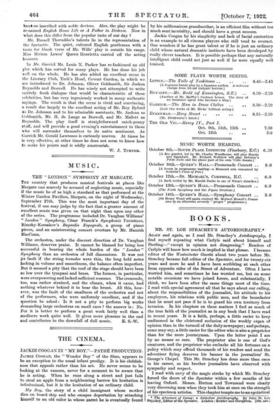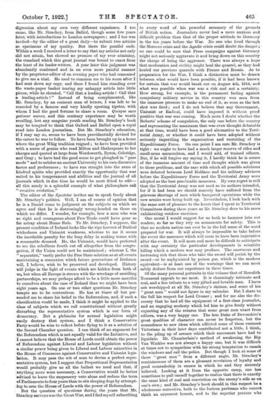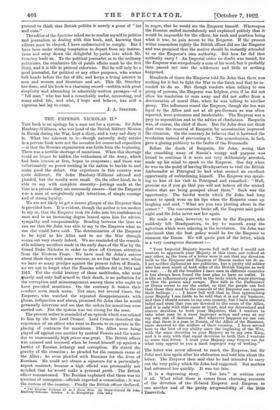BOOKS.
MR. ST. LOE STRACHEY'S AUTOBIOGRAPHY.* Aoanir and again, as I read Mr. Strachey's Autobiography, I find myself repeating what Carlyle said about himself and Sterling—" except in opinion not disagreeing." Readers of Carlyle will know how much is implied in that phrase. I became editor of the Westminster Gazette about two years before Mr. Strachey became full editor of the Spectator, and for twenty-six years and more he and I have been scribbling at each other from opposite sides of the Street of Adventure. Often I have worried him, and sometimes he has worried me, but on some notable occasions we have joined forces, and substantially, I think, we have been after the same things most of the time. I read with special agreement all that he says about our calling, about the responsibilities of the journalist, his attitude to his employers, his relations with public men, and the boundaries that he must not pass if he is to guard his own territory from invasion. In his chapters on these matters I find as much of the true faith of the journalist as in any book that I have read in recent years. It is a faith, perhaps, a little easier to keep undimmed in the cloistered seclusion of the weekly organ of opinion than in the turmoil of the daily newspaper; and perhaps, some may say, a little easier for the editor who is also a proprietor than for the mere journeyman. Upon the latter point I am by no means so sure. The proprietor also is one of God's creatures, and the proprietor who embarks all his fortunes on a policy which may offend thousands of his readers and send the advertiser flying deserves his banner in the journalists' St. George's Chapel. This Mr. Strachey has done more than once in his career, as his brother journalists have observed with sympathy and respect.
I read with envy of the magic stroke by which Mr. Strachey forced the doors of the Spectator within a few months of his leaving Oxford. Messrs. Hutton and Townsend were clearly very discerning men when they took him at once on the strength of his specimen articles. This chapter tempts me to an egotistical • The ddresrws of Living: a Subjective Autobiography. By John St. Loo Str.41eY, Editor of the Spectator. London: Hodder and Stoughton. [20e. net.] digression about my own very different experience. I too came, like Mr. Strachey, from Balliol, though some five years later, with introductions to London newspapers ; and I too was invited—by the editor of a great daily—to submit two articles as specimens of my quality. But there the parallel ends. Within a week I reoeived a letter to say that my articles not only did not attain, but showed no promise of my ever attaining, the standard which this great journal was bound to exact from the least of its leader-writers. A year later this judgment was abundantly confirmed and in an even more painful manner by the proprietor-editor of an evening paper who had consented to give me a trial. He used to summon me to his room after I had sent down my copy, and there I found him standing over the waste-paper basket tearing my unhappy article into little pieces, while he shouted, "Call that a leading-article! Call that a leading-article ! " Instead of being complimented, like Mr. Strachey, by an eminent man of letters, I was left to be consoled by a famous and very kindly sporting tipster, with whom I had the good fortune to share a room. Quisque suos patimur manes, and this contrary experience may be worth recalling, lest any sanguine youth reading Mr. Strachey's book may be tempted to think that Oxford and Balliol open a royal road into London journalism. But Mr. Strachey's education, if I may say so, seems to have been providentially devised for the career he was to follow. To have been brought up in a home where the great Whig tradition reigned ; to have been provided with a nurse of genius who read Milton and Shakespeare to her charges and quoted at large from Wordsworth, Byron, Coleridge. and Gray ; to have had the good sense to get ploughed in "pass mods" and to subdue an ancient University to his own discursive tastes and preferences ; to have run straight into the arms of kindred spirits who provided exactly the opportunity that was suited to his temperament and abilities and the journal of all journals which in due time he would be most fitted to edit— all this surely is a splendid example of what philosophers call "creative evolution."
The editor of the Spectator invites me to speak freely about Mr. Strachey's politics. Well, I am of course of opinion that he is a Daniel come to judgment on the subjects on which we agree and that he is distressingly wrong-headed on those on -which we differ. I wonder, for example, how a man who was so right and courageous about Free Trade could have gono so far astray about Home Rule. To Mr. Strachey, I suppose, the present condition of Ireland looks like the ripe harvest of Radical wickedness and Unionist weakness, whereas to me it seems the inevitable penalty for the long delay in making terms with a reasonable demand. He, the Unionist, would have preferred to see the rebellious South cut off altogether from the congre- gation, if the Union could not be maintained ; whereas I, the "separatist," vastly prefer the Free State solution as at all events maintaining a connexion which future generations of Irishmen will, I believe, wish to be preserved and developed. History will judge in the light of events which are hidden from both of us, but when all Europe is strewn with the wreckage of unwilling partnerships, we may perhaps afford to be a little more merciful to ourselves about the case of Ireland than we might have been eight years ago. On one or two other questions Mr. Strachey tempts me to be contentions. He has at times all but per- suaded me to share his belief in the Referendum, and, if such a classification could be made, I think it might be applied to the class of subjects which we call constitutional without greatly disturbing the representative system which is our form of democracy. But a plebiscite for normal legislation might easily destroy that system, and I think a Conservative Party would be wise to reflect before flying to it as a solution of the Second Chamber question. I can think of no argument for the Referendum which is not equally valid for the Initiative, and I cannot believe that the House of Lords could obtain the power of Referendum against Liberal and Labour legislation without a similar power being given to Liberal and Labour minorities in the House of Commons against Conservative and Unionist legis- lation. It may pass the wit of man to devise a perfect repre- sentative system, but I suggest that Proportional Representation ,would probably give us all the ballast we need and that, if anything more were necessary, a Conservative would be better advised to leave the suspensory veto alone and reduce the term of Parliaments to four years than to stir sleeping dogs by attempt- ing to arm the House of Lords with the power of Referendum.
But the question of questions during the years that Mr. Strachey surveys was the Great War, and I find myself subscribing
to every word of his powerful summary of the grounds of British action. Journalists never had a more anxious and difficult problem than that of the proper attitude to Germany in the ten years before the War. No one who lived through the Morocco crisis and the Agadir crisis could doubt the danger ; no one could be sure that Press campaigns against Germany might not seriously aggravate it and bring down on this country the charge of being the aggressor. There was always a hope that moderation and civility might heal the quarrel, as they had healed our previous quarrels with Franoe and Russia. As to preparation for the War, I think a distinction must be drawn between what would have been possible, if it had been known for certain that war would break out on August 4th, 1914, and what was possible when war was a risk and not a certainty. How strong, for example, is the permanent feeling against compulsory military service in this country was seen from the immense pressure to make an end of it, as soon as the last shot was fired ; and I do not believe that any Government, Unionist or Radical, could have imposed it without proof positive that war was coming. Much more I doubt whether tho Roberts' scheme of compulsion, the only one before the country and representing the maximum that was even thought debatable at that time, would have been a good alternative to the Terri- torial Army, or whether it could have been adopted without seriously imperilling the organisation and recruiting of the Expeditionary Force. On one point I am sure Mr. Strachey is right : we ought to have had a much larger reserve of rifles and small-arms ammunition, and I would add, of trained officers. But, if he will forgive my saying it, I hardly think he is aware of the immense amount of time and thought which was given to these problems, and the care with which all possible solutions were debated between Lord Haldane and his military advisers before the Expeditionary Force and the Territorial Army were adopted as the best practicable measures. My own regret is still that the Territorial Army was not used as its authors intended, for if it had been we should scarcely have suffered from the grievous shortage of men which hampered operations while the new armies were being built up. Nevertheless, I look back with the same sort of pleasure to the hours that I spent in Territorial Committees during these years as Mr. Strachey does to his more exhilarating outdoor exercises.
One moral I would suggest for us both to hammer into our readers, so far as they rely on armaments for safety. This is that no modern nation can ever be in the full sense of the word prepared for war. It will always be impossible to take before the event the measures which will seem to have been imperative after the event. It will more and more be difficult to anticipate with any certainty the particular developments in scientific: killing which a modern war may produce. The enormous and increasing risk that those who take the sword will perish by the sword—or be asphyxiated by poison gas, which is the modern equivalent---is at least one of the warnings that we can most safely deduce from our experience in these times.
Of the many personal portraits in this volume that of Meredith Townsend appeals to me most. It is charmingly intimate and real, and a fine tribute to a very gifted and lovable man. I have not worshipped at all Mr. Strachey's shrines, and some of his "great men" would not figure in my calendar. But I share to the full his respect for Lord Cromer: and for me also the dis- covery that he had all the equipment of a first-class journalist, and an engaging modesty which led him to give freely without expecting any of the returns that some great men exact from editors, was a very happy one. The late Duke of Devonshire's great qualities of character can never be forgotten, but the somnolence to new ideas which afflicted some of these eminent Victorians in their later days contributed not a little, I think, to the piling up of arrears which their successors have had to liquidate. Mr. Chamberlain's method of awakening the Rip Van Winkles was not always a happy one, but it was difficult at times not to sympathise with his strong temptation to smash the windows and call the police. But though I look at some of these "great men" from a different angle, Mr. Strachey's reminiscences of them are a pleasant revelation of loyalty and good comradeship in causes in which he and they sincerely believed. Looking at it from the opposite camp, one has sometimes to pull oneself together to realize that there is exactly the same kind of zeal and conviction on the enemy's side as on one's own ; and Mr. Strachey's book should in this respect be a wholesome corrective, both to the furious partisans who cannot think an opponent honest, and to the superior persons who pretend to think that British politics is merely a game of "ins and outa."
The editor of the Spectator asked me to confine myself to politics and journalism in dealing with this book, and, knowing that editors must be obeyed, I have endeavoured to comply. But I have been under strong temptation to depart from my instruc- tions and stray down the delightful by-paths into which Mr. Strachey leads us. To the political journalist as to the ordinary politicians, the combative life of public affairs must be the first thing, and it is idle to pretend otherwise. But he will only be a good journalist, for political or any other purposes, who warms both hands before the fire of life, and keeps a living interest in men and women and literature and art. This Mr. Strachey has done, and his book is a charming record—written with great simplicity and abounding in admirably-written passages—of a "full man" who has had a remarkably useful, interesting, and many-sided life, and who, I hope and believe, has still a vigorous last lap to come.
J. A. SPENDER.








































 Previous page
Previous page